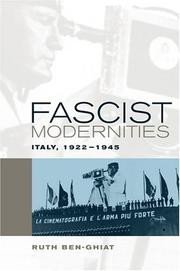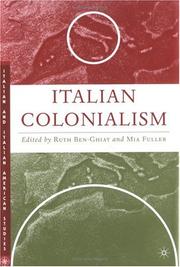| Listing 1 - 10 of 10 |
Sort by
|

ISBN: 0520242165 1282357905 9786612357909 0520938054 1597346144 9780520938052 058538973X 9780585389738 9780520223639 0520223632 9781282357907 9781597346146 6612357908 Year: 2001 Volume: 42 Publisher: Berkeley University of California Press
Abstract | Keywords | Export | Availability | Bookmark
 Loading...
Loading...Choose an application
- Reference Manager
- EndNote
- RefWorks (Direct export to RefWorks)
Ruth Ben-Ghiat's innovative cultural history of Mussolini's dictatorship is a provocative discussion of the meanings of modernity in interwar Italy. Eloquent, pathbreaking, and deft in its use of a broad range of materials, this work argues that fascism appealed to many Italian intellectuals as a new model of modernity that would resolve the contemporary European crisis as well as long-standing problems of the national past. Ben-Ghiat shows that-at a time of fears over the erosion of national and social identities-Mussolini presented fascism as a movement that would allow economic development without harm to social boundaries and national traditions. She demonstrates that although the regime largely failed in its attempts to remake Italians as paragons of a distinctly fascist model of mass society, twenty years of fascism did alter the landscape of Italian cultural life. Among younger intellectuals in particular, the dictatorship left a legacy of practices and attitudes that often continued under different political rubrics after 1945.
Fascism and culture. --- Fascism and culture-- Italy-- History. --- Italy. --- Italy - Politics and government - 1922-1945. --- Fascism and culture --- Fascism --- Regions & Countries - Europe --- Italy --- History & Archaeology --- History --- Politics and government --- Intellectual life --- History. --- Culture and fascism --- Culture --- Fascisme et culture --- Fascisme --- Italie --- Politique et gouvernement --- Vie intellectuelle --- 20th century. --- cultural history. --- dictatorship. --- economic development. --- europe. --- european history. --- fascism. --- fascists. --- historical. --- history of culture. --- history of society. --- history students. --- human condition. --- interwar history. --- italian cinema. --- italian culture. --- italy. --- legacy of fascism. --- model of modern world. --- modern historians. --- modern history. --- modernity. --- mussolini. --- national identity. --- national traditions. --- revolution. --- social boundaries. --- social movements. --- social status.

ISBN: 9780520242166 Year: 2004 Publisher: Berkeley : University of California press,
Abstract | Keywords | Export | Availability | Bookmark
 Loading...
Loading...Choose an application
- Reference Manager
- EndNote
- RefWorks (Direct export to RefWorks)
This cultural history of Mussolini's dictatorship discusses the meanings of modernity in interwar Italy. The work argues that fascism appealed to many Italian intellectuals as a new model of modernity that would resolve the European and national crises.
Fascism --- Fascismo (história) --- Política e governo --- Intelectualidade --- Italy --- History
Book
ISBN: 8815096337 9788815096333 Year: 2004 Publisher: Bologna : Il mulino,
Abstract | Keywords | Export | Availability | Bookmark
 Loading...
Loading...Choose an application
- Reference Manager
- EndNote
- RefWorks (Direct export to RefWorks)
Civilization. --- Fascism and culture --- Fascism and culture. --- Fascism --- Fascism. --- Politics and government. --- History. --- 1900-1999. --- Italy --- Italy --- Italy. --- Politics and government --- Civilization
Book
ISBN: 9780253015525 Year: 2015 Publisher: Bloomington : Indiana University Press,
Abstract | Keywords | Export | Availability | Bookmark
 Loading...
Loading...Choose an application
- Reference Manager
- EndNote
- RefWorks (Direct export to RefWorks)
Ruth Ben-Ghiat provides the first in-depth study of feature and documentary films produced under the auspices of Mussolini's government that took as their subjects or settings Italy's African and Balkan colonies. These "empire films" were Italy's entry into an international market for the exotic. The films engaged its most experienced and cosmopolitan directors (Augusto Genina, Mario Camerini) as well as new filmmakers (Roberto Rossellini) who would make their marks in the postwar years. Ben-Ghiat sees these films as part of the aesthetic development that would lead to neo-realism. Shot in Libya, Somalia, and Ethiopia, these movies reinforced Fascist racial and labor policies and were largely forgotten after the war. Ben-Ghiat restores them to Italian and international film history in this gripping account of empire, war, and the cinema of dictatorship.
Motion pictures --- Imperialism in motion pictures. --- Colonies in motion pictures. --- Motion pictures --- Motion pictures --- History --- Political aspects. --- History

ISBN: 0312236492 Year: 2005 Volume: *2 Publisher: New York (N.Y.) Palgrave Macmillan
Abstract | Keywords | Export | Availability | Bookmark
 Loading...
Loading...Choose an application
- Reference Manager
- EndNote
- RefWorks (Direct export to RefWorks)
Italy --- Repubblica italiana (1946- ) --- Italian Republic (1946- ) --- Włochy --- Regno d'Italia (1861-1946) --- Iṭalyah --- Italia --- Italie --- Italien --- Italii︠a︡ --- Kgl. Italienische Regierung --- Königliche Italienische Regierung --- إيطاليا --- Īṭāliyā --- جمهورية الإيطالية --- Jumhūrīyah al-Īṭālīyah --- Італія --- Італьянская Рэспубліка --- Italʹi︠a︡nskai︠a︡ Rėspublika --- Италия --- Италианска република --- Italianska republika --- Ιταλία --- Ιταλική Δημοκρατία --- Italikē Dēmokratia --- 이탈리아 --- It'allia --- 이탈리아 공화국 --- It'allia Konghwaguk --- איטליה --- רפובליקה האיטלקית --- Republiḳah ha-Iṭalḳit --- Lýðveldið Ítalía --- Itālija --- Itālijas Republika --- Italijos Respublika --- Olaszország --- Olasz Köztársaság --- イタリア --- Itaria --- イタリア共和国 --- Itaria Kyōwakoku --- Italiya Respublikasi --- Италия Республикаси --- Italii︠a︡ Respublikasi --- Итальянская Республика --- Італійська Республіка --- Italiĭsʹka Respublika --- İtalya --- İtalya Cumhuriyeti --- איטאליע --- Iṭalye --- 意大利 --- Yidali --- 意大利共和国 --- Yidali Gongheguo --- Laško --- Sardinia (Italy) --- Colonies --- Administration --- History. --- Africa --- History --- Італійська Республіка
Book
ISBN: 9780230606364 Year: 2008 Publisher: New York : Palgrave Macmillan,
Abstract | Keywords | Export | Availability | Bookmark
Book
ISBN: 9780271093499 Year: 2005 Publisher: University Park, PA
Abstract | Keywords | Export | Availability | Bookmark
 Loading...
Loading...Choose an application
- Reference Manager
- EndNote
- RefWorks (Direct export to RefWorks)
Digital

ISBN: 9780271093499 Year: 2022 Publisher: University Park, Pa Penn State University Press
Abstract | Keywords | Export | Availability | Bookmark
 Loading...
Loading...Choose an application
- Reference Manager
- EndNote
- RefWorks (Direct export to RefWorks)
Book

ISBN: 1845459989 9781845459987 9781845457327 Year: 2010 Publisher: New York Oxford
Abstract | Keywords | Export | Availability | Bookmark
 Loading...
Loading...Choose an application
- Reference Manager
- EndNote
- RefWorks (Direct export to RefWorks)
In 1945, Europeans confronted a legacy of mass destruction and death: millions of families had lost their homes and livelihoods; millions of men in uniform had lost their lives; and millions more had been displaced by the war's destruction, and the genocidal policies of the Nazi regime. From a range of methodological historical perspectives--military, cultural, and social, to film and gender and sexuality studies--this volume explores how Europeans came to terms with these multiple pasts. With a focus on distinctive national experiences in both Eastern and Western Europe, it illuminates how postwar stabilization coexisted with persistent insecurities, injuries, and trauma.
Reconstruction (1939-1951) --- World War, 1939-1945 --- Collective memory --- Memory --- Group identity --- Citizenship --- Military art and science --- Fighting --- Military power --- Military science --- Warfare --- Warfare, Primitive --- Naval art and science --- War --- Birthright citizenship --- Citizenship (International law) --- National citizenship --- Nationality (Citizenship) --- Political science --- Public law --- Allegiance --- Civics --- Domicile --- Political rights --- Collective identity --- Community identity --- Cultural identity --- Social identity --- Identity (Psychology) --- Social psychology --- World War, 1939-1945, in motion pictures --- Retention (Psychology) --- Intellect --- Psychology --- Thought and thinking --- Comprehension --- Executive functions (Neuropsychology) --- Mnemonics --- Perseveration (Psychology) --- Reproduction (Psychology) --- Collective remembrance --- Common memory --- Cultural memory --- Emblematic memory --- Historical memory --- National memory --- Public memory --- Social memory --- National characteristics --- Influence. --- History --- Social aspects --- Motion pictures and the war. --- Law and legislation --- Europe
Digital

ISBN: 9781845459987 Year: 2010 Publisher: New York; ; Oxford Berghahn Books
Abstract | Keywords | Export | Availability | Bookmark
 Loading...
Loading...Choose an application
- Reference Manager
- EndNote
- RefWorks (Direct export to RefWorks)
| Listing 1 - 10 of 10 |
Sort by
|

 Search
Search Feedback
Feedback About UniCat
About UniCat  Help
Help News
News